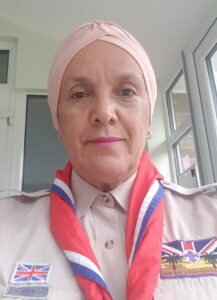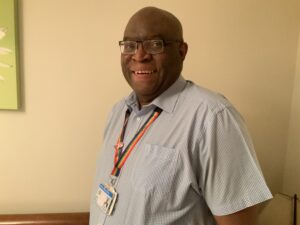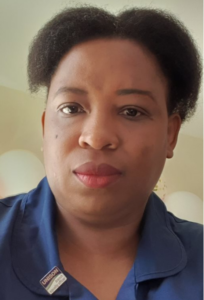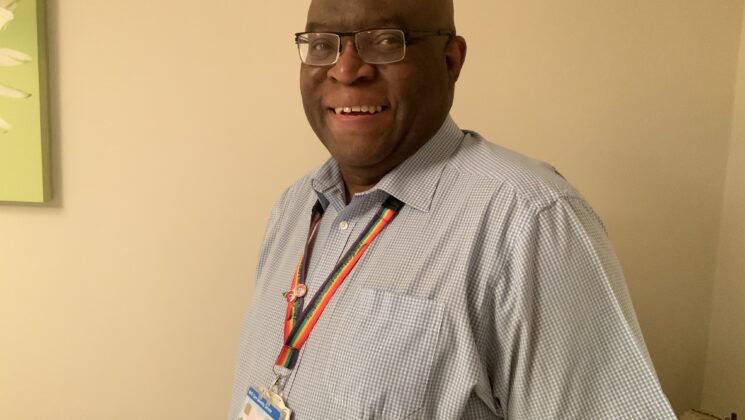In the last two years, thousands of Black UNISON health workers risked their lives to save others, despite the statistical reality that they themselves were at higher risk of dying from COVID-19.
In the NHS only 1.3% of staff in the most senior bands are Black and the majority of Black staff in the NHS are in non-medical roles. UNISON heard from Black members on what there is to celebrate, and what needs to change.
‘I can count on one hand over the course of my career how many Black matrons I’ve met’
Yasma Osman is a 62-year old nurse based in Manchester who has over 45 years experience in the NHS: “Pre-COVID, I was doing bank shifts in cardiac and coronary care, but since COVID-19 hit, it’s been too high risk for me to be on the shop floor so I’ve moved into a training role. I train nurses in vaccinations, life support, cannulation and phlebotomy.
“I also volunteer for a Muslim charity that runs a local food bank, and am a volunteer for British Scouting Overseas. Two weeks a year I go and volunteer in Somaliland too. I’m a mother of 6 and a grandmother of 9.”
Yasma takes pride in the work that she does but is haunted by the impact of the pandemic on Black nurses: “I love this job, I love patient management, and I know I’m good at it. I feel motivated to do the best for my patients, and when I go in on a night shift and patients are uncomfortable, it’s my goal to make sure by morning they’re better.
“But the pandemic has been really tough. It has been tough on all nurses, and so many Black medical personnel have died in the pandemic. I know that COVID-19 is going to leave a massive mental health impact on so many nursing colleagues, and this comes on top of the reality that so many Black NHS workers are already treated horrendously.

Yasma Osman
“In Black History Month, I want to see more about Black British History in the UK and focus on Black role models today. You always see a lot about Malcolm X, but it’s about so much more than that. Within the NHS, I want to see more Black people in managerial positions, as directors of nursing or matrions. I can count on one hand over the course of my career how many Black matrons I’ve met. Things do seem to be improving, but it’s just far too slow.
“I still face racism at work – both from patients and staff. I’ve been doing this job for 45 years, and some people will still see me at work with my headscarf and assume I don’t know what I’m doing. I often feel that I have to prove that I’m just as good, if not better than others.
“The hardest thing is that, when we speak up about racism, we’re considered aggressive or to have an attitude. We live in an institutionally racist society, so there’s no reason why the NHS would be any different.”
‘Celebrating Black History Month at this time is a breath of fresh air’

Patrick Onyema
Patrick Onyema is a senior quality improvement facilitator based in Thurrock and was a UNISON Health Heroes award winner in 2019. He completed his nursing associate programme last December: “One of the things I’m most proud of in the last two years is completing my training and working during the pandemic. I’ve embraced the changes that have happened as a result of the pandemic.
“In 2019, when I won the health heroes award, I didn’t think that I would continue my course and get through everything that happened and all the changes. I’m proud of where the role of the nursing associate has taken me so far. I am also proud of all our nurses, most especially our Black and ethnic minority colleagues who have gone over and beyond the call of duty in the pandemic by answering that clarion call to serve humanity.”
Patrick was a crucial support for people with dementia during the pandemic: “I was supporting the dementia crisis team, and did a lot of training for staff, families and people with dementia. Routine and structure is really important for people who have dementia. If someone has been going to a day centre the last three years at 10am every day, and suddenly they can’t because of lockdown, it’s bound to impact their behaviour. My team was there to support those families and their loved ones with the changes in routine. It was our job to provide comfort and care – both to the patients and to their families.”
Patrick described how, though his focus was dementia, physical and mental health can never be separated: “during the pandemic, we found that a lot of people with dementia were not drinking enough fluid due to isolation. When you’re dehydrated, it can cause urine infections and delirium. We understood this, and so, instead of rushing in heavy-handed to give people medication to calm them down, we put new measures in place to help people keep drinking. This role was important in the community during the pandemic.”
What does Patrick make of Black History Month? “I think celebrating Black History Month at this time is a breath of fresh air, appreciating all of the hard work that Black and ethnic minority nurses have put into the service of the country whilst fighting the pandemic. Especially given that a lot of the casualties from the pandemic were from a Black or minority ethnic background.
“Some of us, like myself, have got families in the UK and abroad, who we’d see once a year. But with the pandemic, in service to the country and because of our love for health, a lot of people had to sacrifice seeing their loved ones miles and miles away. You couldn’t. I had a lot of difficulties during that period, because my dad was unwell – and I missed weddings. To celebrate Black History Month, especially now, at this stage of the pandemic and what is going on. It’s just right.”
‘If we don’t all stick together, we’re not going to make a change’

John Campbell
UNISON branch secretary John Campbell is the staff side chair for Sheffield Teaching Hospitals, and in 2012 served as Sheffield’s first Afro-Caribbean lord mayor.
He’s worked for the same NHS trust for just over three decades: “I came to the trust for four weeks as a summer driver 32 years ago. Over this time, I’ve set up Black staff networks and mentoring systems, and brought about many structural changes through UNISON.
“We have Black members’ officers, a regional Black members’ group, but we still have to push to get more branches to engage. If we don’t all stick together, we’re not going to make a change, and we’ll be having the same discussions 2-3 years down the line.
“Black History Month is an important opportunity to recognise the contributions of Black people, not just to the health service but to the economy. There are 18,000 staff working at my NHS trust. The majority of Black staff are in the lower paid jobs, as cleaners and porters. We’ve had issues we’re continually raising, and we’ve asked them to conduct reviews on how Black staff are being employed across the trust. Both reports that came in said the trust was verging on institutional racism.
“Change is not happening quick enough, and Black History Month is an opportunity to remind people of that. The pandemic has affected the Black community, especially Black staff in the NHS, and it does feel like there has been division amongst staff in the last year, both with the pandemic and the murder of George Floyd. UNISON has had to pick up more cases than we would have thought around inappropriate comments made at work.”
‘We are not only Black in October, but the rest of the time too’

Gamu Nyasoro
Gamu Nyasoro is a nurse and works as clinical skills and simulation manager for Kettering General Hospital. She is Branch chair for Northamptonshire Healthcare Workers and sits on the National Black Members’ Committee. During COVID-19, she spent a lot of time supporting her fellow health workers.
“COVID-19 was tough. I was managing the medical assessment unit and supporting others who were on the shop floor. I’ve moved off the shop floor for my own health, otherwise I would be on the frontline still. I just couldn’t do it any more.
“When the information that said Black people were more vulnerable to COVID-19 mortality due to the genes we carry first came out it was so scary. But when we tried to put that message across to our white colleagues, they didn’t take it well. I remember a manager, who is white, saying ‘you’re telling me, when we’re sitting in this room all together, the virus would target you and not me?’
“That person was managing other people in the team, some of whom were Black. It’s very difficult. I was so anxious and afraid with all the news coming out – especially when nobody knew much about COVID-19 but we heard that it’s killing more Black people than anyone else.”
Gamu remembers the days of the pandemic where hospitals were overflowing with food donations from their local communities, but felt that the workers who had contracted COVID-19 and were stuck at home were often forgotten by their colleagues: “When some of the Black members were off sick with no support in the community, I spoke with nurses in the community to make sure that there were people who could cook food for them and to take them paracetamol.
“I’ve spent a lot of time supporting Black health workers in the last year – this included overseas nurses who had only been in the country for a couple of months, and had no support network here.”
Gamu’s commitment to supporting members led to her challenging hospital management to show more care towards their staff: “The only thing some managers did was call their staff once the 14 days was up and ask when they were coming back to work.
“I spoke with my hospital and they put in a task team that started speaking with members who were off sick with COVID-19, to see if there was any way to help. They spoke to someone who owned a shop, to see if they could do home deliveries. That was where UNION really stepped in – the support that I get from my fellow colleagues within UNISON helps me. They really do help.”
For Gamu, this year’s Black History Month is overshadowed by the grief caused by the pandemic: “I just want people to acknowledge the hard work that everybody has done in the last year and a half. I’d like us to focus on each and every one of us who were there during the pandemic and remember those who were lost.
“They were heroes that were taken by this pandemic, that the government sacrificed for all of us to be here. We should never have lost so many healthcare workers. If there wasn’t racism, a lot of us wouldn’t have been sent to wards that were high with COVID-19 when we were more vulnerable than others.
“Unfortunately, they are not here to speak about what happened to them in that situation. Those are our heroes, our unsung heroes, those people and the people who are suffering with long COVID.
“The message of Black History Month for me is solidarity. If we stand together in solidarity, we can achieve more, and our voices will be heard. We are not only Black in October, but the rest of the time too. I want to see more recognition of that.”
Yasma, Patrick, Gamu and John are just four of the thousands of Black health workers who have made history this year.
‘People who change history are not always those with the loudest voices’
UNISON head of health Sara Gorton said: “Black History Month is a chance to celebrate the often-unheralded achievements of Black people throughout history. The pandemic this year has hit Black communities hard, so we want to take this time to celebrate the Black NHS workers who are ‘making history now’.
“People who change history are not always those with the loudest voices or those doing the grandest projects – the biggest changes can come from people taking the smallest steps. NHS workers and union activists know that the small steps they take may make a difference to people’s lives, now and in the future, and that’s why we wanted to share their stories.”

